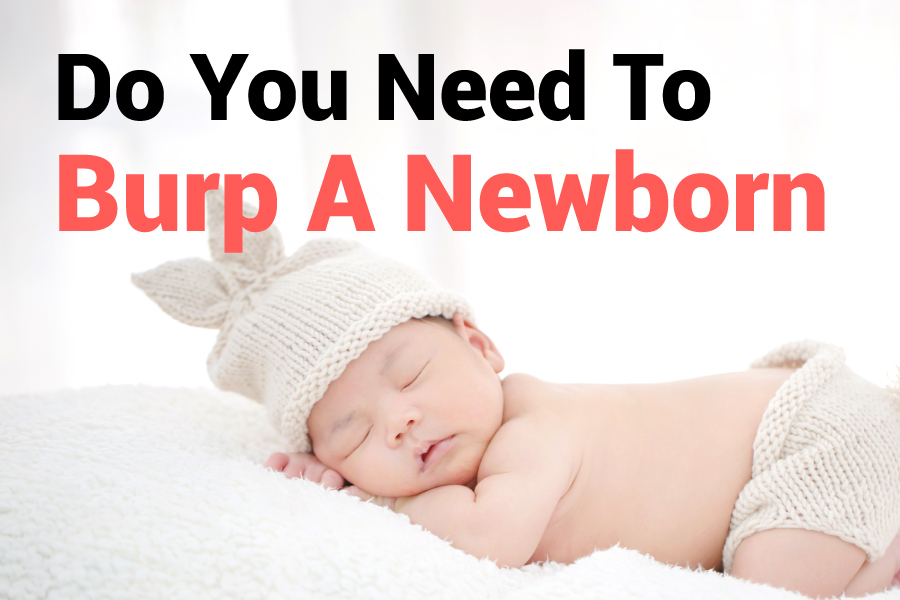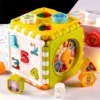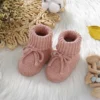A newborn brings with him delight but also a fair deal of challenges. One of the most frequently asked questions is, “Do you burp a newborn?” The assumption may be that this is a silly question, but, in reality, the baby must be comfortable and healthy. Babies accidentally swallow air while feeding which can lead to discomfort and gas if not burped out. Mastering the importance of burping, the right techniques, and how often to do it can make a huge difference in your baby’s feeding experience and overall well-being. This article will help you learn everything that you are required to know about burping your newborn baby. You will study the signs that your baby needs to be burped and different burping techniques, along with tips to make things easier for both you and your baby.
Do You Need To Burp A Newborn?
Yes, one does need to burp a newborn to release swallowed air while feeding which causes discomfort or gas in the stomach. If not burped, food will not digest properly and can result in colic. Burping uses light pats on the back of a baby when carried upright or on a shoulder. The stated process does the effective burping.
Why Burping A Newborn Is Crucial
Burping after each meal is essential in a newborn baby’s feeding routine. It allows for the release of air that a baby usually swallows in the course of feeding. This may be uncomfortable and lead to bloating or gassiness, causing your baby to become colic, irritable, and cranky. By burping your newborn, you’ll prevent such situations and ensure they remain comfortable after feedings.
Moreover, burping can facilitate good digestion. If the air is trapped in the baby’s stomach, it will prevent digestion and hence cause the baby to spit up more. There is less chance of this if he were regularly burped, so digestion would be better, and less incidence of regurgitation.
There are a few methods to burp a baby: having the baby upright against your chest, lying face-down across your lap, or having the baby sit on your lap and support their head. All of them are ways for a baby to let out trapped air efficiently.
Be aware of the signs that your baby needs to be burped. General signs to look for indicating the need for burping are a cranky mood while feeding or shortly after, squirmy behavior, or drawing away from the breast or bottle. By following these symptoms, you’ll be able to burp your baby right before really bad discomfort sets in.
Incorporating burping into the feeding routine may take some patience and practice. Not every baby’s going to burp every time, but persistence is the key here. The more consistent the burping is, the happier and more content the baby will be. He’ll also feed more efficiently and sleep more soundly.
Techniques For Burping A Newborn
1. Over-the-Shoulder Technique
One of the most used methods for burping the newborn is the over-the-shoulder technique. Holding your baby upright against your chest with his chin resting on your shoulder, support their bottom with one hand and gently pat or rub their back with the other. This position helps to release the trapped air effectively.
2. On Your Lap
Another good way is to place your baby facing away from you on your lap. One hand supports the chest and head, whilst the other gently pats or rubs his back. It is an upright position that will therefore help bring up air bubbles that can cause discomfort.
3. Face-Down on Your Lap
Place your baby face down across your lap. Keep his or her head somewhat elevated. Hold the baby in place with one hand, and gently pat or rub his or her back with the other. This position works well if the baby is cranky or hasn’t seemed to burp with other positions.
4. Burp Your Baby Successfully
Burping a newborn baby can sometimes be tricky, but here are some tips that may make things easier: keep your baby in a comfortable position and try burping them halfway and at the end of each feeding. Do this gently and patiently, as some babies take longer to burp than others.
5. When to Help
If you suspect that your baby has gas or is particularly fussy during feedings, and you appear to be following good burping practices anyway, then it may be time to consult with your pediatrician. Continuing feeding problems can call for medical advice to ensure the health and comfort of your baby.
Alternative Perspective On Burping
Though this can be seen as an essential practice for babies, some alternative points of view hold that burping a baby is not always necessary. Some pediatricians and experts say that if the baby breastfeeds well and latches properly, he might swallow less air and so may require burping less frequently.
Most burping is for bottle-fed babies. If your baby was formula-fed, he might have swallowed more air during his meal, so he may need to burp. Breastfed babies may not need burping after every feeding simply because they swallow very little air. Each baby differs, and you are called upon to watch your baby’s behaviors and comfort.
Another perspective looks at the calmness during feeding. Stress and anxiety while feeding result in a higher intake of air by the baby. A very calm and comfortable feed would thus bring the amount of burping down to the minimum. After all, babies are different in their nature and needs, and parents adapt accordingly.
How To Burp A Newborn Baby: Some Practical Tips
Pay Heed to Baby
Watch out for your baby’s cues, as when they start squirming, in case they are fussy, or drawback on the bottle or nipple while feeding, these could be some indications that they have to burp.
Gentlemanly Motions
While patting or rubbing the baby’s back, gentle rhythmic motion is always to be taken. Often, soft pressure succeeds in dislodging any trapped air.
Burp Your Baby on the Other Positions
Try burping your baby in different positions to find out what works best for him. Sometimes babies are more prone to burp over the shoulder, while some may do so sitting on your lap.
Take Breaks During Feeding
Stop halfway through feeding and burp your baby. This may allow air ingested from the first half of the feeding to be let out, thus avoiding discomfort.
Stay Calm and Patient.
Sometimes it takes time to burp. If your baby doesn’t burp instantly, then stay calm and patient, and give him some more moments in a comfortable position before trying again.
Conclusion
Burping is an essential practice for the comfort and health of your newborn. Prevent discomfort, gas, and fussiness associated with feeding by helping your baby release swallowed air. Mastering how to burp a baby and knowing the signs that indicate when your baby needs to be burped make things so much easier on both you and the baby. Remember, every baby is very different; sometimes it takes time and patience to build up the right routine for burping. You want to make sure your baby stays cheery and healthy during and after feedings; the right approach is what matters.
Frequently Asked Questions
Q1: How Often Is Burping Recommended For My Newborn?
A1: Burp your newborn halfway through and at the end of each feeding. However, if your baby seems comfortable, they may not need to burp so often.
Q2: My Baby Doesn’t Seem To Burp After Feeding. What Should I Do?
A2: If your baby doesn’t burp after a few minutes, that’s okay. Not all babies have to burp after every feeding. So long as they seem comfortable and content, one need not worry.
Q3: Will My Baby Give Me Any Signs If They Need To Be Burped?
A3: Yes, they can show it through their behavior. They will just be fussy, squirmy, or pull away from the breast or bottle during feeding.
Q4: Does Burping Prevent Colic?
A4: Burping can release the gas, further relieving the discomfort but cannot completely prevent colic. The causes of colic are many, and burping is one such technique to reduce a few of its symptoms.
Q5: Are There Any Risks Associated With Burping A Newborn?
A5: Burping generally is a very safe process when performed gently. Be sure to properly support your baby’s head and neck; also, use gentle motions so you avoid any kind of risks.








